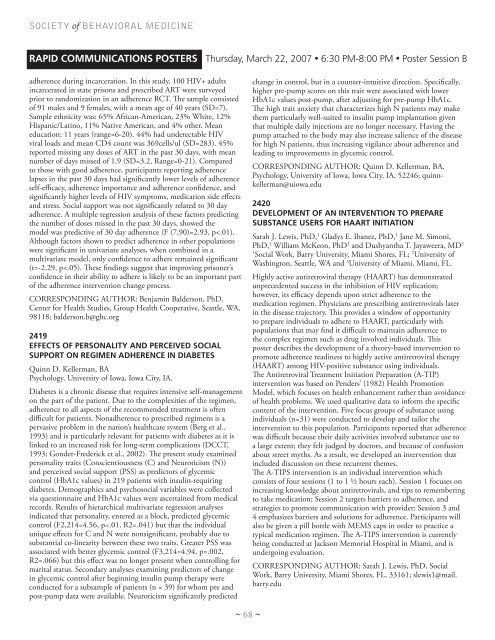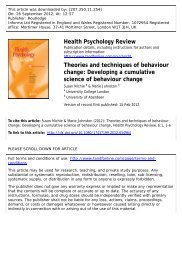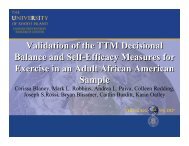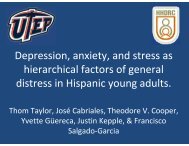SOCIETY <strong>of</strong> BEHAVIORAL MEDICINE Rapid Communications Posters Thursday, March 22, <strong>2007</strong> • 6:30 PM-8:00 PM • Poster Session B adherence during incarceration. In this study, 100 HIV+ adults incarcerated in state prisons and prescribed ART were surveyed prior to randomization in an adherence RCT. The sample consisted <strong>of</strong> 91 males and 9 females, with a mean age <strong>of</strong> 40 years (SD=7). Sample ethnicity was: 65% African-American, 23% White, 12% Hispanic/Latino, 11% Native American, and 4% other. Mean education: 11 years (range=6-20). 44% had undetectable HIV viral loads and mean CD4 count was 369cells/ul (SD=283). 45% reported missing any doses <strong>of</strong> ART in the past 30 days, with mean number <strong>of</strong> days missed <strong>of</strong> 1.9 (SD=3.2, Range=0-21). Compared to those with good adherence, participants reporting adherence lapses in the past 30 days had significantly lower levels <strong>of</strong> adherence self-efficacy, adherence importance and adherence confidence, and significantly higher levels <strong>of</strong> HIV symptoms, medication side effects and stress. Social support was not significantly related to 30 day adherence. A multiple regression analysis <strong>of</strong> these factors predicting the number <strong>of</strong> doses missed in the past 30 days, showed the model was predictive <strong>of</strong> 30 day adherence (F (7,90)=2.93, p
<strong>2007</strong> SBM Annual Meeting & Scientific Sessions March 21-24, <strong>2007</strong> FINAL PROGRAM Rapid Communications Posters Thursday, March 22, <strong>2007</strong> • 6:30 PM-8:00 PM • Poster Session B 2421 PSYCHOLOGICAL ISSUES OF ADOLESCENTS PRESENTING FOR LAPAROSCOPIC BANDING Jennifer Duffecy, PhD, 1 Maria Bleil, PhD, 2 Susan Labott, PhD, 1 Allen Browne, MD, 1 Christiane Stahl, MD, 1 Nancy Browne, APN, 1 Carlos Galvani, MD, 1 Ai-Xuan Holterman, MD 1 and Mark Holterman, MD, PhD 1 1 Univ <strong>of</strong> Illinois - Chicago, Chicago, IL and 2 University <strong>of</strong> California - San Francisco, San Francisco, CA. An estimated 15% <strong>of</strong> children and adolescents are overweight. This epidemic <strong>of</strong> adolescent obesity has resulted in a need for effective methods <strong>of</strong> weight loss and maintenance. Bariatric surgery and laparoscopic banding (LAGB) in particular are common and effective in the adult population but have not yet been approved for use in adolescents. As we begin to study adolescents who seek bariatric surgery, we find new issues that warrant our attention as mental health providers. The current paper is a descriptive study <strong>of</strong> the first 40 adolescents who presented for LAGB in an FDA-approved study <strong>of</strong> its safety and efficacy in this age group. Patients were 60% female aged 12 to 18 (X=15). The average BMI was 50, ranging from 34.2 to 74.5. Ethnicity was 58% Caucasian and 42% other minorities. Data were collected using clinical interviews, chart review and self report measures. Depression was reported by 30%, while 13% endorsed current suicidal ideation and 15% had previous suicide attempts. In addition, 28% had current or past episodes <strong>of</strong> deliberate self-harm. Problematic anxiety was endorsed by 30%; 10% were homeschooled due to discomfort with social situations. 13% had previous inpatient psychiatric admissions while 68% had previous outpatient treatment. Psychotropics were taken by 37%, typically antidepressants or ADHD medications. Previous work documents high levels <strong>of</strong> psychopathology in clinical samples <strong>of</strong> obese adolescents. The findings <strong>of</strong> the current study suggest that adolescents who attend a bariatric clinic may represent the most disturbed <strong>of</strong> the overweight adolescents. These results speak to the need for renewed attention to the development <strong>of</strong> empirically-based interventions to aid in the treatment <strong>of</strong> this group as we work to help them safely manage the stress associated with bariatric surgery and obtain successful outcomes. CORRESPONDING AUTHOR: Jennifer Duffecy, PhD, Univ <strong>of</strong> Illinois - Chicago, Chicago, IL, 60612; jduffecy@psych.uic.edu 2422 EMOTIONAL DISCLOSURE: AN EFFECTIVENESS STUDY FOR PATIENTS WITH RHEUMATOID ARTHRITIS Jay L. Cohen, PhD, 1 Mark Lumley, PhD, 1 Deb Macklem, MA, 1 J. Leisen, MD 2 and A. Mosley-Williams, MD 1 1 Psychology, Wayne State University, Detroit, MI and 2 Henry Ford Health System, Detroit, MI. Since Pennebaker and Beall’s (1986) landmark study, an extensive literature has generally supported the health benefits <strong>of</strong> emotional disclosure. However, recent meta-analyses have questioned the magnitude <strong>of</strong> these effects, and the few disclosure studies <strong>of</strong> rheumatoid arthritis (RA) patients have mixed results. This study ~ 69 ~ addressed the following questions: Does field-based, unsupervised disclosure provide benefits for RA patients? Does the method <strong>of</strong> disclosure (written or verbal) matter? Do these findings vary over time? A sample <strong>of</strong> 150 patients with RA (89.6% female; 58.1% Caucasian, 41.9% African American; age M=54 years) were recruited from local clinics, assessed for baseline data, and randomized to either written or verbal (tape recorder) disclosure about stressful experiences or control topics at home for 4 days, 20 minutes/day. Follow up assessment at 1, 3, and 6 months included objective health measures (e.g. erythrocyte sedimentation rate, blind physician ratings <strong>of</strong> swollen and tender joints), behavioral measures (e.g. walking speed, pain med use, observer-rated videotaped pain behavior), and self-reported physical (e.g. McGill Pain Questionnaire-SF, AIMS-2) and psychological (e.g. perceived stress scale, PANAS) well-being. There were no observed differences at 1 or 3 months between disclosure and control groups, with the exception at 3 months <strong>of</strong> increased positive affect in the disclosure group (p=.038). At 6 months, significant benefits <strong>of</strong> disclosure were observed only in walking time (p=.014), and sensory (p =.035) and affective pain (p=.016). Findings were not moderated by the method <strong>of</strong> disclosure. Despite sufficient power, multiple assessment points, and a range <strong>of</strong> measures, we failed to find consistent evidence for the benefits <strong>of</strong> disclosure. These findings suggest that disclosure conducted in the field has weaker effects than found in more highly controlled, supervised settings. Such evidence suggests limitations to the view that emotional disclosure interventions might replace traditional psychological interventions. CORRESPONDING AUTHOR: Jay L. Cohen, PhD, Psychology, Wayne State University, Detroit, MI, 48202; jay.cohen@wayne.edu 2423 THE RELATIONSHIP BETWEEN DISTRESS LEVELS AND INTEREST IN PSYCHOSOCIAL SERVICES IN HEAD AND NECK CANCER PATIENTS Kirsten E. Martin, BS, Derek R. Anderson, BS and Kristin M. Kilbourn, PhD, MPH AMC Cancer Center, University <strong>of</strong> Colorado and Health Sciences Center, Denver, CO. Head and neck cancers (HNC) are considered one <strong>of</strong> the most traumatic forms <strong>of</strong> cancer due to the amount <strong>of</strong> pain, discomfort, and disfigurement caused by treatment which may lead to high levels <strong>of</strong> distress. The Psycho-Oncology Screening Tool (POST) was developed to assess distress, physical symptoms, practical concerns and interest in psychosocial services. This study examined 44 HNC patients (mean age 58.7; 93% Caucasian, 70.5% married, 79.5% male) who completed the POST before and after radiotherapy treatment. The number <strong>of</strong> depressive symptoms endorsed by participants significantly increased from pre- to post-treatment, t (43) = -3.34. The individual symptoms that showed significance included both cognitive symptoms (feeling worthless, t (43) = -1.95; thoughts <strong>of</strong> life not being worth living, t (41) = -2.35) and somatic symptoms (decreased interest in sex, t (39) = -2.45; decreased energy, t (22) = -2.02; change in appetite, t (42) = - 3.1). Comparison <strong>of</strong> pre and post changes in VAS measures found significant increases in reported levels <strong>of</strong> fatigue, t (39) = -3.85. Despite the fact that there were significant increases in distress we found a decrease in interest in obtaining psychosocial services

















